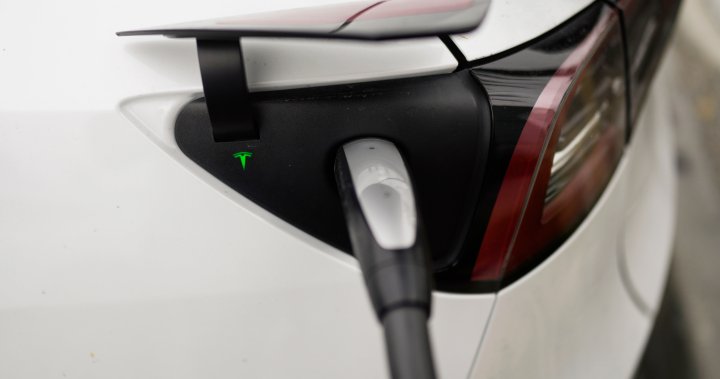Resistance Grows: Car Dealers Challenge EV Mandate Requirements

Table of Contents
Financial Burden of EV Mandate Compliance
Compliance with EV mandate requirements presents a considerable financial challenge for car dealerships. Adapting to a predominantly electric future requires significant upfront investment and carries the risk of substantial losses. Dealers face a multifaceted financial burden, impacting their bottom line and long-term viability.
- Cost of Installing Charging Infrastructure: The installation of Level 2 and DC fast chargers represents a substantial capital expense. The cost varies based on the number of chargers, their power output, and the necessary electrical grid upgrades. This investment can be particularly challenging for smaller dealerships with limited financial resources.
- Training Costs for Sales and Service Staff: Selling and servicing EVs require specialized knowledge and training. Dealerships must invest in training programs to equip their staff with the skills needed to handle EV-specific technologies, batteries, and charging systems. This adds to the already considerable cost of employee training.
- Inventory Management Challenges: Managing EV inventory presents unique challenges. Unlike gasoline-powered vehicles, the demand for EVs varies significantly across different regions, leading to potential overstocking in some areas and shortages in others. This necessitates careful inventory planning and potentially increased holding costs.
- Potential for Unsold EV Inventory: The risk of unsold EV inventory is a significant concern. If demand doesn't meet the mandated sales quotas, dealerships could be left with unsold EVs, tying up capital and potentially resulting in financial losses.
Infrastructure Gaps and Consumer Readiness
Even with the best intentions, the current infrastructure and consumer readiness levels are significant impediments to meeting the aggressive EV mandate requirements. A lack of robust charging infrastructure and consumer hesitancy regarding EVs create substantial hurdles for dealerships.
- Insufficient Public Charging Stations: The availability of public charging stations, particularly in rural areas, remains inadequate. This "range anxiety" – the fear of running out of charge – is a major deterrent for potential EV buyers, impacting demand and making it difficult for dealerships to meet sales quotas.
- Long Charging Times: Charging an EV takes considerably longer than refueling a gasoline car. This inconvenience is a key factor contributing to consumer reluctance, especially for those with busy lifestyles.
- High Initial Purchase Price: The upfront cost of EVs is generally higher than comparable gasoline-powered vehicles, making them less accessible to a large segment of the population. This price disparity is a significant barrier to widespread adoption.
- Range Anxiety: The limited range of some EVs, especially in comparison to gasoline-powered vehicles, fuels range anxiety among potential buyers. This concern is exacerbated by the lack of widespread charging infrastructure, hindering broader acceptance.
Challenges in Meeting EV Sales Quotas
Meeting the mandated EV sales quotas presents numerous challenges for car dealerships, particularly in markets with low demand. The penalties for failing to meet these quotas can be substantial, putting dealerships in a difficult position.
- Varying Demand for EVs: The demand for EVs varies considerably across different regions. Dealerships in areas with low EV demand face an uphill battle in meeting their quotas, potentially incurring significant penalties for non-compliance.
- Penalties for Non-Compliance: The penalties for failing to meet mandated EV regulations can be severe, including financial fines and potential legal repercussions. This creates immense pressure on dealerships to sell EVs, even in markets where demand is low.
- Marketing and Sales Challenges: Marketing and selling EVs to consumers hesitant to switch from gasoline-powered vehicles requires specialized strategies and resources. Dealerships must invest in effective marketing campaigns that address consumer concerns and highlight the benefits of EVs.
- Securing Adequate EV Inventory: Securing enough EV inventory to meet the mandated quotas can be challenging due to supply chain constraints and fluctuating production schedules. This supply chain disruption further complicates the already difficult task of fulfilling quotas.
Legal Challenges to EV Mandate Requirements
The growing discontent among car dealers has led to legal action challenging the EV mandate requirements. Dealer associations and individual dealerships are filing lawsuits, arguing that the mandates are economically unfeasible and infringe on their business operations.
- Lawsuits Filed by Dealer Associations: Several dealer associations have filed lawsuits against government agencies, challenging the legality and practicality of the electric vehicle mandates.
- Arguments Based on Economic Impact: A core argument in these legal challenges centers on the significant economic hardship imposed on dealerships by the mandates. The substantial upfront investments required to comply are cited as economically unsustainable for many dealerships.
- Arguments Concerning Consumer Choice: The lawsuits also raise concerns about consumer choice and the mandates' potential to limit consumer options in the automotive market.
- Challenges Based on Business Operations: Dealerships argue that the mandates interfere with their ability to operate their businesses effectively and efficiently, particularly in markets with low EV demand.
Conclusion: Navigating the Future of EV Sales and the Ongoing Debate on EV Mandate Requirements
The implementation of EV mandate requirements is creating significant challenges for car dealerships. The financial burdens of adapting to the new EV landscape, coupled with inadequate infrastructure and consumer hesitancy, present formidable hurdles. Legal challenges further highlight the complexities and concerns surrounding these electric vehicle mandates. Navigating this transition requires a balanced approach, considering the economic realities facing dealerships, the need for robust infrastructure development, and the importance of fostering consumer acceptance of EVs. To stay informed about the ongoing debate and its impact on the automotive industry, explore resources from industry associations and government agencies dealing with EV regulations. Understanding the nuances of these EV mandate requirements is critical for all stakeholders involved.

Featured Posts
-
 Calvin Kleins New Campaign With Lily Collins Photo Gallery
May 12, 2025
Calvin Kleins New Campaign With Lily Collins Photo Gallery
May 12, 2025 -
 Your Guide To Exploring Montego Bay Jamaica
May 12, 2025
Your Guide To Exploring Montego Bay Jamaica
May 12, 2025 -
 Calvin Kleins New Campaign Star Lily Collins Photo 5133601
May 12, 2025
Calvin Kleins New Campaign Star Lily Collins Photo 5133601
May 12, 2025 -
 Ufc Champion Valentina Shevchenkos Custom Dragon Themed Gear Unveiled
May 12, 2025
Ufc Champion Valentina Shevchenkos Custom Dragon Themed Gear Unveiled
May 12, 2025 -
 Eric Antoine En Couple Devoilement De Sa Vie Sentimentale Et Sa Relation Avec Une Personnalite M6
May 12, 2025
Eric Antoine En Couple Devoilement De Sa Vie Sentimentale Et Sa Relation Avec Une Personnalite M6
May 12, 2025
Latest Posts
-
 25 Years At Allianz Arena Thomas Muellers Emotional Send Off
May 12, 2025
25 Years At Allianz Arena Thomas Muellers Emotional Send Off
May 12, 2025 -
 Alex Winters Early Career The Unknown Mtv Shows Before Freaked
May 12, 2025
Alex Winters Early Career The Unknown Mtv Shows Before Freaked
May 12, 2025 -
 Thomas Muellers Allianz Arena Farewell 25 Years Of Emotion
May 12, 2025
Thomas Muellers Allianz Arena Farewell 25 Years Of Emotion
May 12, 2025 -
 Untapped Talent Alex Winters Early Sketch Comedy On Mtv
May 12, 2025
Untapped Talent Alex Winters Early Sketch Comedy On Mtv
May 12, 2025 -
 Before Freaked Exploring Alex Winters Obscure Mtv Comedy
May 12, 2025
Before Freaked Exploring Alex Winters Obscure Mtv Comedy
May 12, 2025
